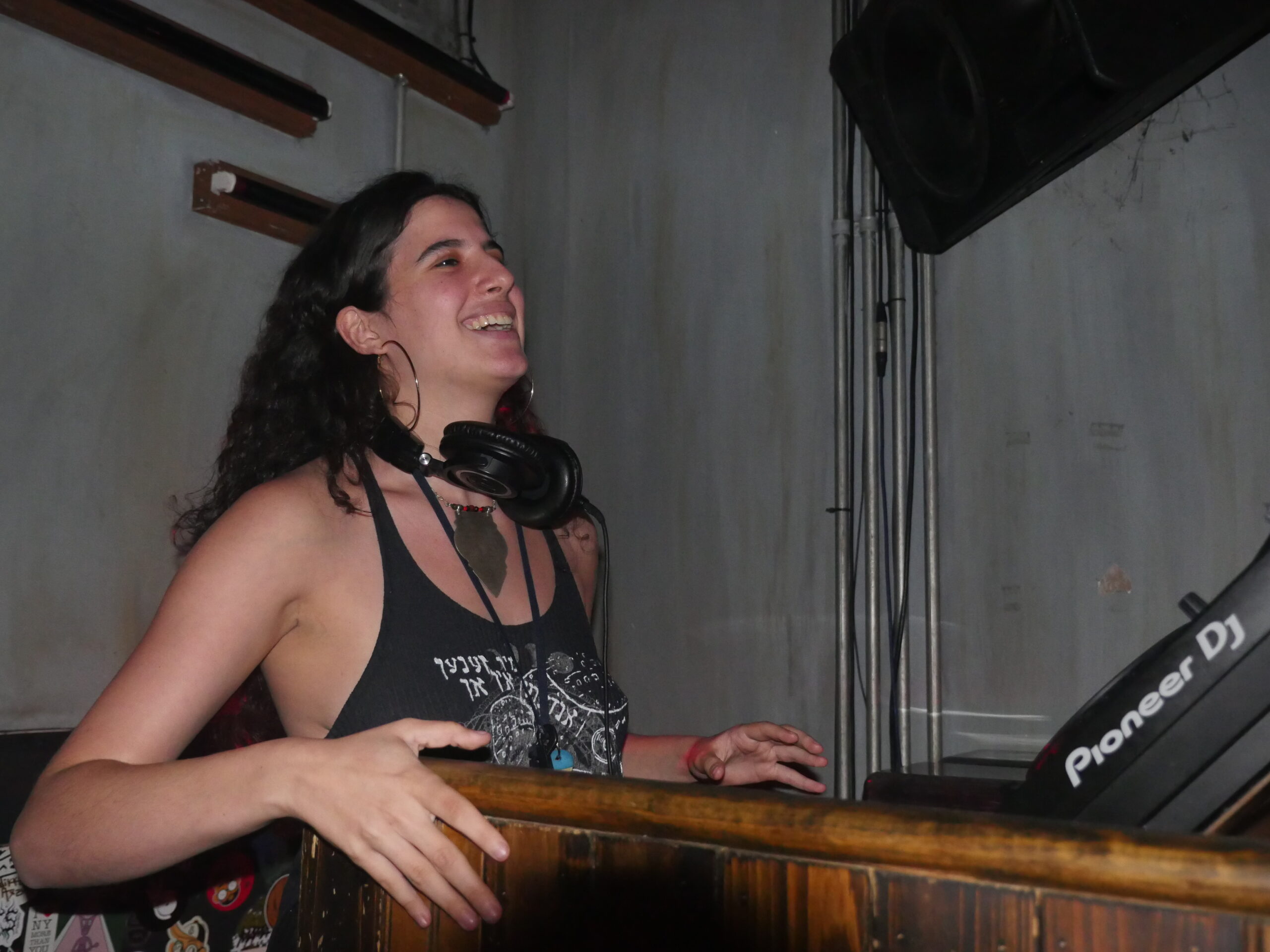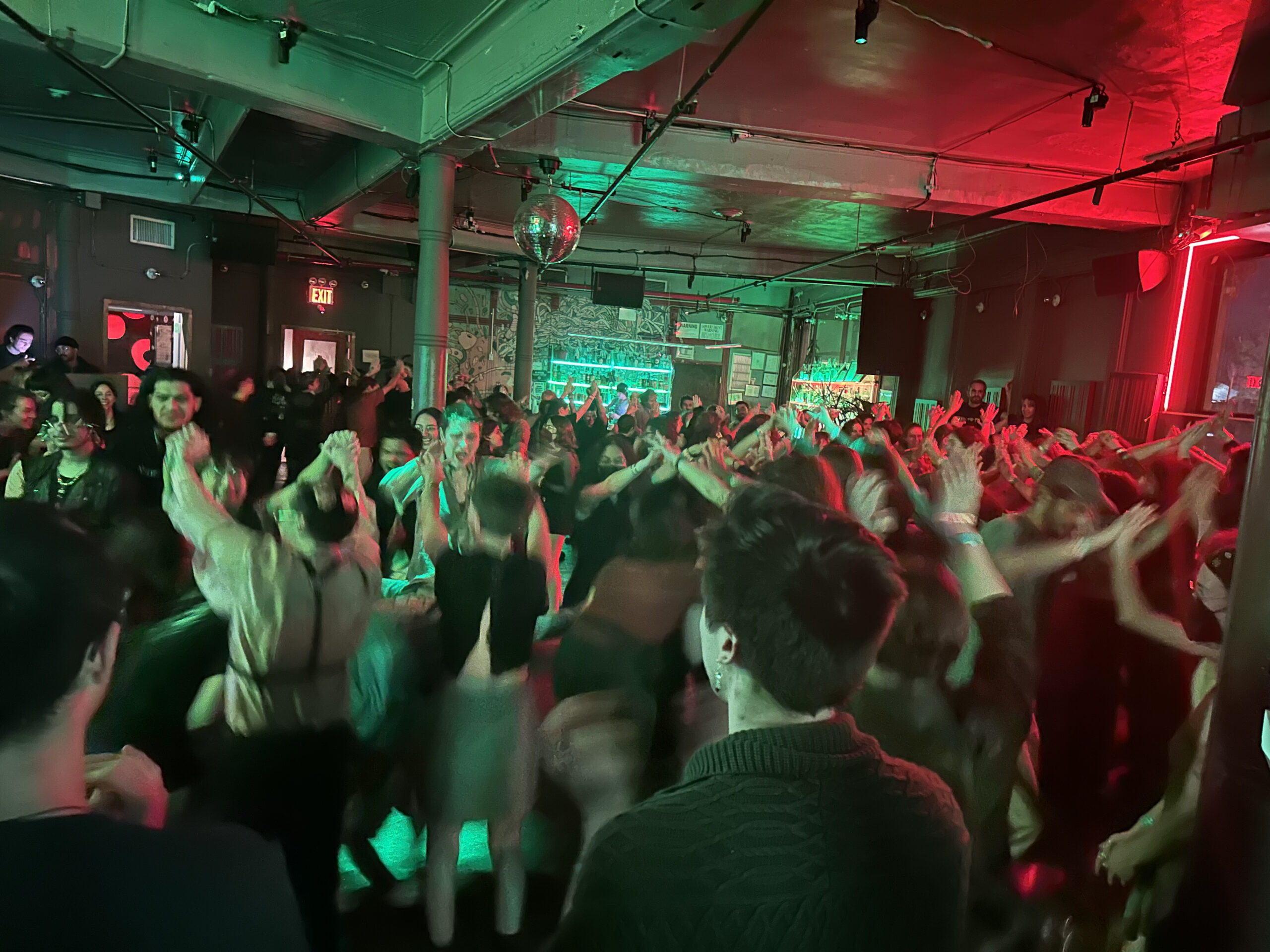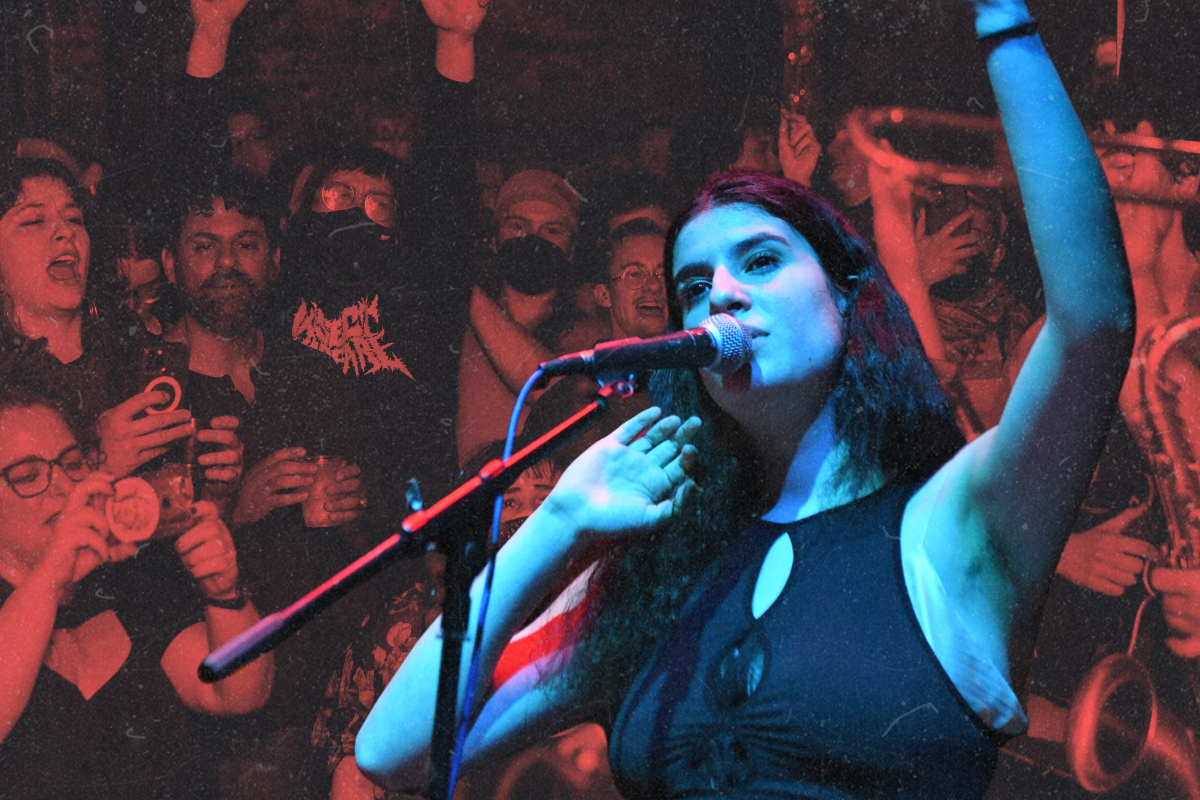Walking into Chicago’s favorite lesbian bar, Dorothy in Ukrainian Village, the vibes are damn near perfect. Every direction you turn there are sexy Jewish queers conversing in the dark, debonair underground cocktail lounge. The excitement in the air is palpable. Everyone knows they are about to bask in the soundtrack to the current moment in Jewish radical politics. Finally, a cool ass space for people like us to feel free, to feel motivated, to feel less alone.
Intriguing local artwork is set out for auction as the Jewish Museum of Chicago is facilitating a fundraiser for families fleeing violence in Gaza. At the same time, the local Chicago klezmer band Upshtat Zingerai plays an ecstatic opening set. The event is called Kleztronica, but it’s clearly about much more than just fresh and danceable Yiddish beats.
As I sat there sipping my cocktail in a black jumpsuit, I remembered months ago seeing a friend of a friend post an image from a Kleztronica concert on their Instagram story. At that moment I began to realize the cultural import that Kleztronica was having. The person who posted the picture was flexing and they knew it. And boy, I was jealous.
The radical music movement spearheaded by DJ Chaia has been traveling around Jewish communities throughout the U.S. and beyond. Finally it had arrived in Chicago. I got to meet Chaia in person when she visited Chicago and eventually set up an interview to learn more about her, Kleztronica and her new single “Borough Park.”
Chaia grew up on the Upper West Side of Manhattan in an environment steeped in Jewish music and Yiddish culture. Her father was a Jewish studies teacher and she recalls how her household growing up always seemed to have some kind of seminar, class or intellectual meeting going on. “Rabbis and cantors and Jewish musicians and all kinds of Jewish professionals would come in and out of our house to learn from him,” Chaia said.
It was through the community learning in Chaia’s own home that she discovered Yiddish culture and Yiddish music in particular. She also met a key mentor named Basya Schechter who was studying with Chaia’s father during these formative years. Schechter herself has a storied career in many corners of the Jewish music world, but is maybe most well known for her band Pharaoh’s Daughter.
Through her teen years, Chaia picked up the accordion and began involving herself in community klezmer music before enrolling at New England Conservatory, committing herself to serious study of the genre.
She had already been making and selling beats in high school, but once she was in college, Chaia started to attend raves and grew increasingly interested in electronic music. She cites her friend Adrian Chabla as being a huge help in teaching her about the radical queer and Black histories of electronic music and techno music in particular. Particular DJs who have inspired Chaia include DJ Voices, Sama’ Abdulhadi, Tiny T-Bone and WTCHCRFT.

For Chaia, from an Ashkenazi Jewish background, she felt she knew a similar history through klezmer music and saw an opportunity to elevate shared radical political ideals. “Techno is created within the socio-political context of Black people in Detroit — it’s a sort of underground liberatory community. Similarly, klezmer was created in a social context of Eastern Europe, where Jews were living as second-class citizens and had to create their own sort of underworld language and culture,” Chaia explained.
In defining Kleztronica, Chaia said: “It’s a way of using the Black liberatory music of techno and house to carry forward a radical history of Yiddish liberation. It’s the particular strategy of sampling, but it’s also the way the genre takes place in a cultural context through these raves and parties that embrace radical Yiddish lineages and radical queerness and radical solidarity and radical intercultural collaboration as sort of part of the cultural context for the genre.”
For Chaia, Kleztronica is a manifestation of radical diasporic culture as well as decolonial and anti-Zionist aspirations. This is why Chaia tries to have Kleztronica events that are both enrapturing dance parties, but also moments of cross-cultural collaboration and support. “We’ve been able to connect radical practitioners in both scenes to do joint solidarity ventures, mutual aid efforts [and] actions in support of Palestinian liberation,” said Chaia.

A recent event that encapsulates this for Chaia was a “Diasporic Techno Night” in Bushwick which featured six different artists from six different diasporic musical traditions playing their own brand of techno music. Just like this one, many Kleztronica events include artists both in and outside of the Jewish community, from drag practitioners to poets and essayists to dancers to visual artists and beyond.
“This event, it really brought a lot of different people into the room, and that, for me, is the most important thing,” Chaia said. “Even intergenerationally — to see a little baby in a nightclub and to see an old lady in a wheelchair in a nightclub, and to see everyone in between. That’s really because everyone is tied by the same ancestral narrative, whether that’s Kleztronica or another cultural music that we’re standing in solidarity with.”
The ancestral narrative runs deep for Chaia in her most recent single as well. “Borough Park,” a track featuring vocal recordings of Chaia’s late grandmother, released on Sept. 13. The track brings to life memories from her grandmother’s upbringing in the Borough Park neighborhood of Brooklyn.
“For a while, this was the only recording I had of her, and I wanted to find some kind of way to honor her,” said Chaia. “She grew up really Orthodox, but her vision of what Jewish life was just seems so expansive to me. And she would describe crazy dance parties and stuff that seemed to expand beyond gendered boundaries, and beyond class boundaries and beyond denominations of Jewishness.”
The track also samples a Yiddish song recorded in the 1960s by Ethel Raim called “Oyfn Oyvn.” It’s a cheeky little tune that describes two young people — strangers — who have a saucy encounter where they end up having sex on top of an oven. To Chaia, the song reflects the astonishingly liberated way her own grandmother recounted her young adulthood.
Chaia will soon be doing a small tour in Europe, hitting Austria and Germany. With her collaborator Adrian Chabla, she also hopes to be releasing an album of eight Yiddish songs (including “Borough Park”) in the coming year. It’s clear that Chaia is just getting started, and she’s creating sounds and spaces that many Jewish people are currently looking for. This Jewish writer, for one, is very grateful for the existence of DJ Chaia and the Kleztronica scene.



